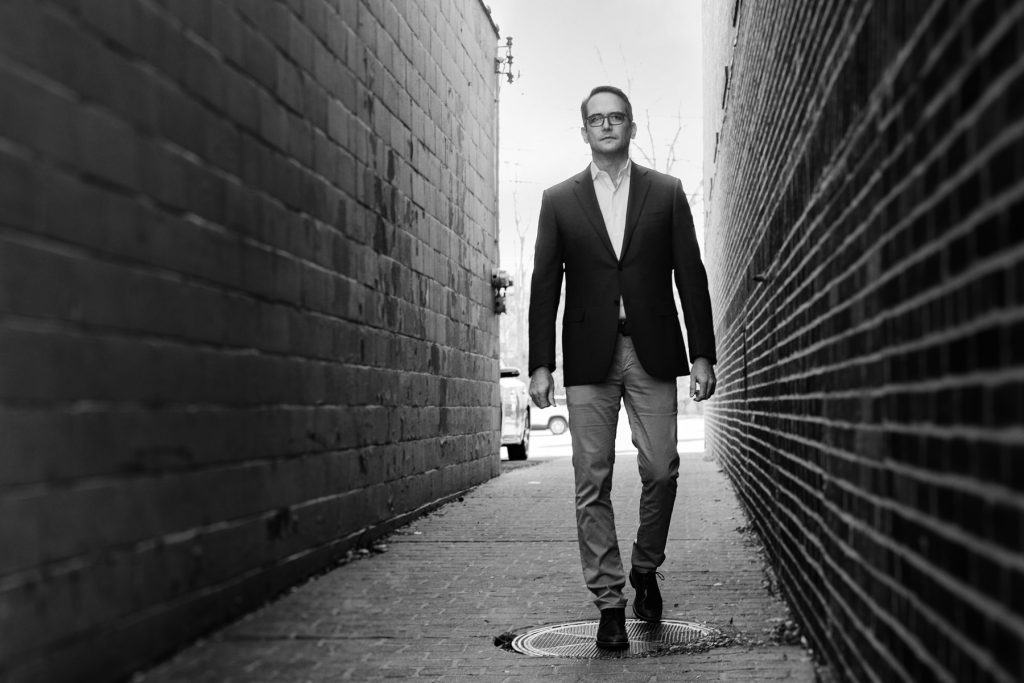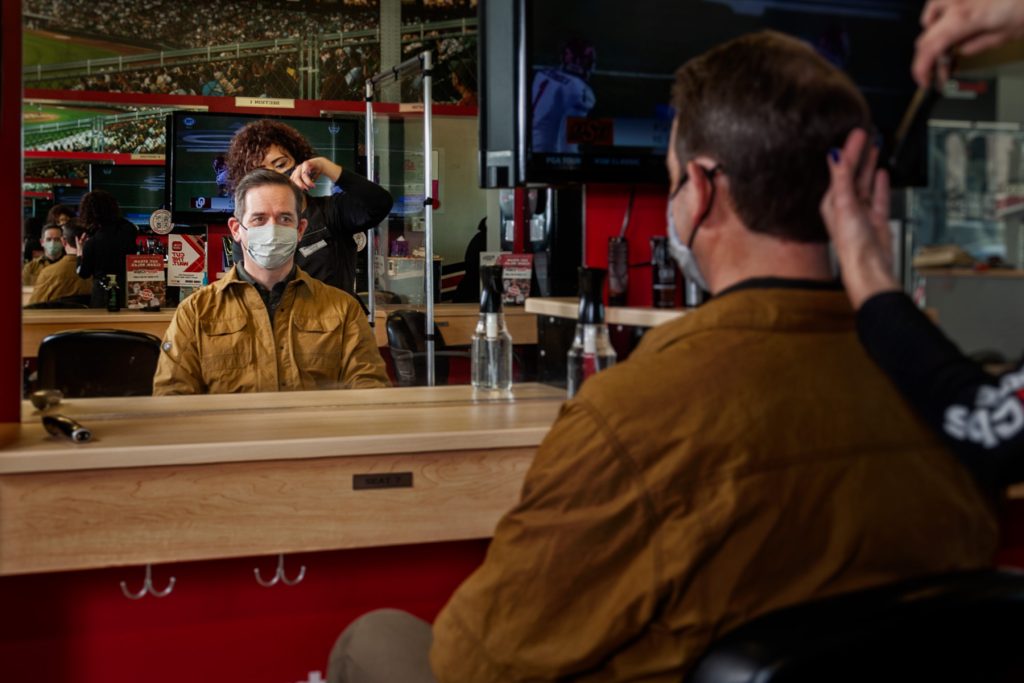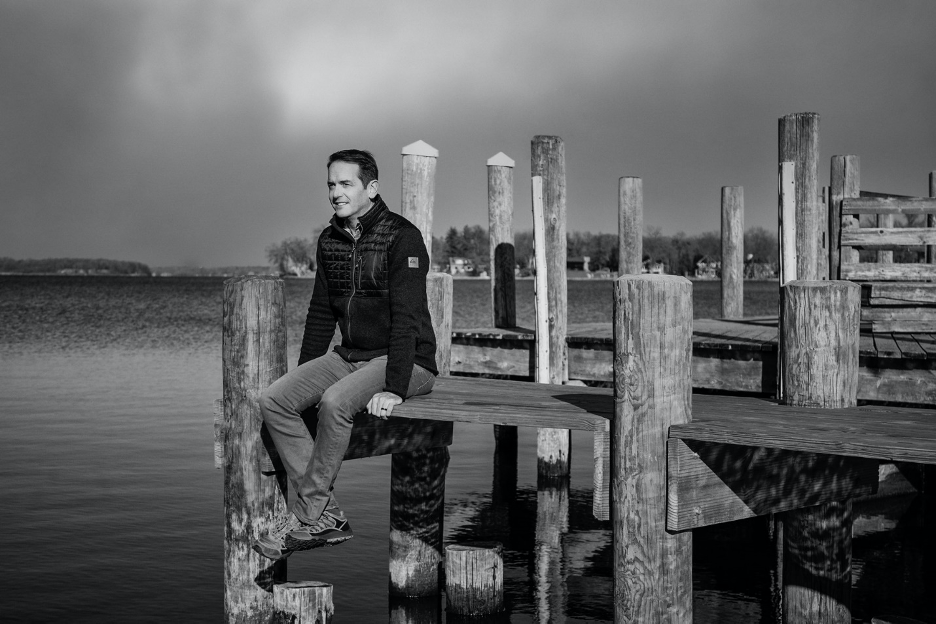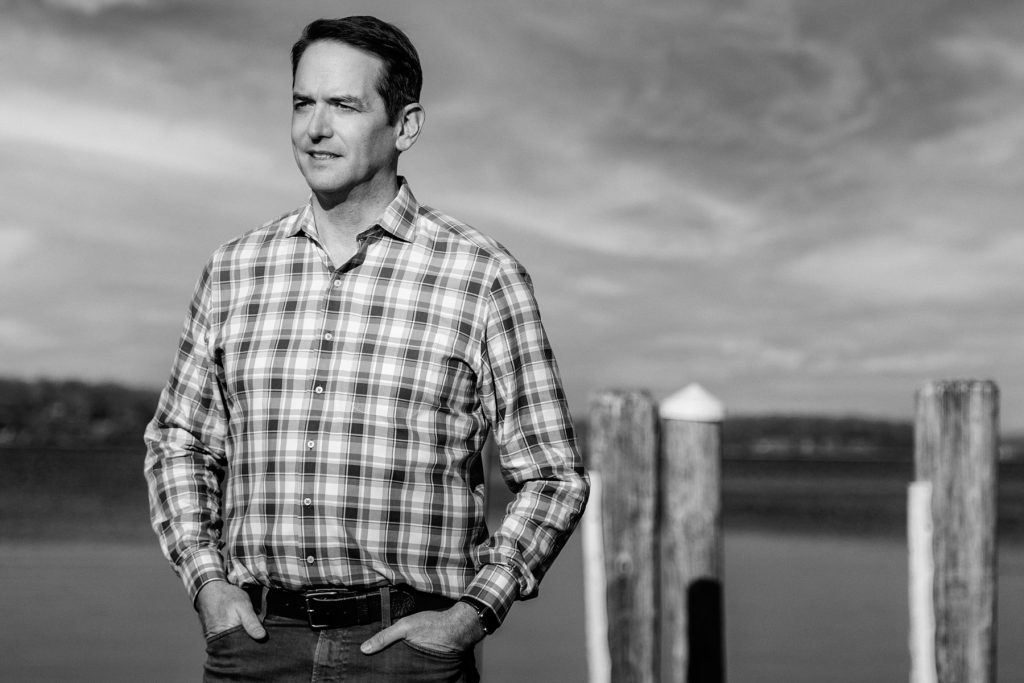Editor’s Note: Worth columnist Arick Wierson teamed up with renowned photographer John Wallace for an in-depth interview and photo essay aimed at capturing the many sides of American health care entrepreneur Jeff Fritz and his take on what lies ahead for the sector in 2021 and beyond.
Almost every major industry, trade or craft has its titans and superheroes. These are the men, and in some cases a few women (although still too few of them), whose names are synonymous with the sectors they either created or those that they helped shape in such a profound way that their modern incarnation is indelibly bonded to their name. Historically, names defined industries. John D. Rockefeller was synonymous with Big Oil; Vanderbilt meant shipping and railroads; Cecil Rhodes and mining.

In modern times, we can easily point to Jeff Bezos and e-commerce, financial data and Michael Bloomberg, electric cars and Elon Musk. Other sectors with such vast implications for humanity have enjoyed multiple, larger-than-life luminaries. Take Bill Gates and the late Steve Jobs, who, for many years, split duties as the archetypical megastars of the personal computing revolution. Mark Zuckerberg, perhaps enshrined by Aaron Sorkin’s 2010 touchstone film The Social Network, is most closely associated with social media, although Twitter cum Square’s Jack Dorsey comes in a close second.
However, as we gaze across the largest sectors of the modern global economy, there is one—in fact, the biggest of them all—in which no single name comes to mind. Not one.
I am referring, of course, to health care.
That is not to suggest that the health care sector landscape is barren of household names. Amid a global pandemic that has claimed millions of lives worldwide, there are a few expert physicians who have received a lot of on-camera time in recent months; President Trump’s “love me, love me not” coronavirus advisors Dr. Anthony Fauci and Dr. Deborah Birx easily come to mind. CNN’s Sanjay Gupta and MSNBC’s Vin Gupta (no relation) have emerged as the calming and reassuring, medsplaining voices of the pandemic on cable TV. Harvard’s Dr. Atul Gawande is another celebrated MD who has successfully parlayed his health care chops into pop media punditry. And last (yet most certainly least) are the C-List celebrity MDs of daytime talk TV who are generally known only by their monosyllabic names such as Oz, Phil, Stork and Ho.
But physicians—no matter their level of media exposure—are still mere practitioners, linebackers and safeties trying to keep disease from moving downfield. On the offensive side of the ball is a vast ecosystem of pharmaceutical and scientific R&D, medical device manufacturing and health care delivery companies—all determined to put points on the board by arming the health care industry with personalized tools that support preventative medicine and promote wellness. But the men and women who lead these companies are anything but well-known.

“Health care is different than every other industry on so many levels,” observes legendary investor Ben Narasin of Silicon Valley-based NEA, one of the world’s largest and most active venture capital firms. “There has never been that one name associated with health care because there has never been that one moment when everything changed. Instead, what we have are hundreds of highly impactful medical and pharma breakthroughs in any given year, each one devouring and overshadowing the importance of the others in a sector already set up for slow, incremental progress. Structurally, it’s different than most other sectors in that regard.”
“Of course, some of the health care sector’s groupthink—particularly about its commitment to the slow deliberative approach to innovation—has suffered something akin to shock therapy since the onset of the coronavirus, where each day the toll of being overly cautious has been measured in body bags,” added Narasin. “I think COVID-19 is health care’s ‘come-to-Jesus’ moment.”
But if the world is searching for a singular messiah to lead health care into a post-COVID afterlife, we would all be best advised to not hold our breath. “Health care is and will always be—perhaps more than any other industry—a team sport,” commented veteran health care insider Jodi Hubler, CEO of Minneapolis-based health care investment firm Lemhi Ventures, who has also done double duty as the president of Bind, the health insurance disruptor that has raised nearly a quarter of a billion dollars in venture financing since its inception in 2016. “No one person or single enterprise will shoulder the next chapter of health care; but make no mistake about it, COVID-19 put our industry to the test, stressing nearly all facets of the system in ways we never thought possible and in doing so, exposed massive vulnerabilities that we need to address immediately.”
“It’s clear that we need more dynamism in the C-suite; we need to bring new types of thinking to the table—ideally executives who already know health care and can appreciate its infinite complexities, but also those who have spent time in technology, understand modern innovation cycles and appreciate the value of breaking things and failing fast,” added Hubler. “The next global pandemic—and it’s not a question of if but when—might be more lethal and much more contagious than COVID-19. We probably won’t have a year to figure stuff out next time.”
Now, as trucks packed with lifesaving doses of COVID-19 vaccines continue to fan out across the country, their headlights a beacon for a return to normalcy, that question—What about the next one?—is on the minds of leaders across the health care industry. As a recent article in Nature openly mused, COVID-19, as devastating as it was in historical terms, in many ways represented a lucky break for health care; it could have been a hell of a lot worse.
To better understand what this new post-contagion health care landscape will look like, and what it will demand of its leaders, Worth turned to a number of past and present health care executives, digital and high-growth health investors and industry insiders to ask which names come to mind when thinking about the archetypical health care leader of 2021 and beyond. One name that kept coming up was veteran health care technology CEO Jeff Fritz, fresh off his own successful exit, having helped guide the recent October merger between Revel and NovuHealth to create Icario, now the largest health care engagement enterprise in North America. Known for building and scaling technology-enabled health care companies, we reached out to Fritz to get his take on what lies ahead for health care leadership in the wake of the life-altering pandemic that upended life as we knew it in 2020.

At age 51, Fritz embodies the ideal health care leader of the post-COVID health care landscape in many ways. The Icario merger marked Fritz’s fifth successful exit from a health-tech or health-related technology company that he either started from scratch or took from very early stage to exit or merger. Before Icario, Fritz was the founder and CEO of Lighthouse1 a precursor to Evolution1, a leading cloud-based technology and payment solutions platform in the health care industry that was sold to IT and technology juggernaut Wex Inc. for over half a billion dollars in 2014. Prior to Evolution1, Fritz led the growth and sale of several companies in the employee benefits industry.
Fritz has been around the block more than a few times, scaling successful companies that play at the intersection of technology and health care, and if 2020 taught him anything, it’s that the road ahead will look nothing like what we see in the rearview mirror.
The next 10 years in health care will see more change than we have in the last hundred.
Q: So, Jeff, 2020—take it or leave it?
A: Boy that’s a tough one—so many people have really suffered this year, not only in terms of their health, but the stinging pain stemming from the economic shutdowns. But it has also catapulted health care years ahead of where we would be without this ravaging global health crisis. Fortunately, a lot of the positive innovations to come out of 2020—the widespread acceptance of telehealth, for example—is toothpaste that is not going back in the tube. We still have a long way to go as an industry, but COVID has been a real wake-up call. Its far-reaching impacts stirred even the most conservative, and sometime recalcitrant, voices within health care into action. It’s now glaringly obvious how much work there is to do because we are not where we should be on so many fronts.
What one thing that jumps out at you that the health care industry realized in this past year that you think it never would have in a “normal” year?
One of the first things that comes to mind is the role and importance of communications. You know, there’s an old joke that “health care communications” is something of an oxymoron. From the fine print stuffed into your bag at the pharmacy, to the fast-talking disclaimers that are now part of every medication commercial on TV, to the intimidating statement of benefits aka “This is not a bill” letters you get from health insurers, we as an industry have always been terrible at talking to end-consumers. Now, we are seeing how communications can have literal life-and-death consequences.
In terms of communications, what kind of grade would you give the health care industry during COVID?
Well, to state the obvious, to have federal officials in Washington saying one thing—or even multiple things—and state and local officials saying another, and when success means acting quickly and decisively, well that’s an issue if you are trying to fight off a novel coronavirus. That being said, although there were some fumbles early on, government officials and health care institutions finally, for the most part, were able to come together and distill their collective talking points down to a few simple messages: “Wear a mask,” “Keep six feet apart,” “Wash your hands with soap for 20 seconds,” etc.
Those are pretty basic messages across pretty basic channels.
Progress is progress. Even before COVID, it was clear that we as an industry must get a lot better at communicating to consumers around the issues of personal health and wellness, while meeting them where they are at. Whether they are at the pharmacy, at home or on their phone, we need to be agile enough to meet consumers on their terms. We tend to talk to everyday people like they were all pre-med in college, so—if anything—I think we did some collective learning around the issue of making medspeak more relatable and actionable during the pandemic.
What do you make of the politicization of COVID? Many feel politics got in the way of a more robust response.
For a long time—as far as I can remember—the health care industry has sort of seen itself as hovering above the fray of national politics on the vast majority of issues. There was no Republican or Democratic way to treat breast cancer. There wasn’t a stinging, polarized debate raging across kitchen tables in America about the best way to address heart disease. We were health care. We were above most of it.
Is politicized health care the new normal?
I think the trend is that there will be a lot more politics imbued into the health debate in this country. We certainly see that when it comes to discussing the ‘social determinants of health.’ It can be a dangerous gerrymandering of health care resources.
In the banking and mortgage industry, we had, for many years, what was called ‘redlining,’ in which regulators and banks teamed up to systematically box out people of color from certain neighborhoods—a legacy which lives on today. The same thing is happening today in health care, where an array of economic factors become conjoined to create health care deserts—many of which isolate society’s most vulnerable members.
You are referring to the external economic and environmental factors that impinge upon an individual’s health?
You nailed it. We used to talk about poverty as a driver and predictor of health, but that was pretty much a non-starter because that word ‘poverty’ conjured up decades of political baggage. It’s a loaded term that quickly devolved into endless debates around ‘social safety net,’ societal contract and rugged American individualism, and capitalism. Once the industry started to refer to panoply of health drivers outside of one’s DNA—access to quality health care, transportation, nutrition and environmental factors—as the ‘social determinants of health,’ we were finally able to gain some traction on the issue.
COVID hit the most vulnerable really hard.
Yes, it did. With COVID, those individuals at the bottom of the economic totem pole have largely been those who suffered disproportionately more than those with a higher quality of life. The social determinants of health and health outcomes go hand in hand. It’s a big issue for health care as we come out of COVID. How do we strengthen the most fragile strata of society so that we are better prepared when the next pandemic hits?
Would you say that consumer experience as a disruptive force in health care is another major post-COVID storyline?
The new consumer health care experience, powered by advanced technology, is creating the possibility of personalized experience at scale. Its bespoke health care en masse. Certainly, the industry’s focus on end-consumers was something that had been building for some time, but 2020 really accelerated that trend with digital tools.
Before the contagion hit, the industry was already doing a somewhat better job at being ‘consumer-first,’ albeit using primarily ‘old-school’ analog channels like call centers or fancy lobbies in health care clinics. 2020 was the year when digital tools were forced to take the lead. The ability to see your doctor from the comfort of your living room couch—and have health plans cover that—was a major step. Remote tele-visits at scale are already making the entire industry so much more efficient. Quality distance learning portends to democratize the next generation of nurses and physicians. The role big retail will play in deploying health care…I could go on and on about how a consumer supported with next-generation technology is likely to be the biggest disruptive force in the next 10 years across health care.
What will the typical consumer health care experience be like in the future?
I think the future will be remarkably different. Not in 2021 necessarily, but sometime within the next 10 years, you’ll see a confluence of things coming together that today live in separate galaxies. When you go to the gym to workout, your routine will be synched with your medical records and your health care providers and, aided by sophisticated AI, your primary care physician will be able to not only monitor but recommend certain regimens and routines. When an ambulance comes to pick you up, they will know your complete health and family history. The internet of things will be a major source of data collection. Almost everything will look quite different. The next 10 years in health care will see more change than we have in the last hundred.
Sounds a bit like Big Brother. Not sure if I want my doctor and my trainer knowing I cheated and ate a donut for breakfast.
Privacy concerns and data ownership are obviously important issues that will have to be worked out on a parallel track. Ultimately, you will be in control of how much data you share, but there will be incentives in place for sharing more as opposed to less. But you shouldn’t be eating that donut anyway!
Speaking of consumer health care communications, congratulations on your recent merger of Revel and NovuHealth. That must feel good to be able to get a deal like that done in 2020.
Thank you. Fortunately, Tom Wicka [the cofounder and CEO of NovuHealth] and I, as well as the boards of the two companies, had been laying the groundwork for this deal well before COVID hit, so a lot had been sorted out before COVID. I’m not going to say it was easy, but the Novu and Revel teams, together with Novu’s new CEO, Steve Wigginton, who came on in the spring, really came together to put a deal together by the fall. Lots of moving parts amidst a global pandemic, but we got the deal done. The new combined entity was announced in October, and the new brand, Icario, is now the largest health care communications company in North America.
What does Icario mean?
We are a big fan of Dan Buettner and his research into so-called “Blue Zones,” where people live longer, healthier and more fulfilling lives than anywhere else on the planet. One of these areas is on the Greek Island of Icaria. And since the new combined entity is all about empowering health plans with the tools and insights to encourage and incentivize their members to take health actions, we thought the name made a lot of sense.
***
It is almost cliché at this point, but one of the truisms of this past year that is equally applicable across a wide range of industries is that the unprecedented levels of upheaval born out of 2020 forced changes that under normal circumstance would have taken years to play out; in 2020, changes in the health care arena that would have taken a decade or more to bear out happened in a matter of weeks.
“Health care, despite being a multitrillion dollar slice of the U.S. economy, is highly fragmented, much of it delivered on a state or regional level. Couple that with layers of governmental regulation and copious self-policing mechanisms, and you have one of the slower moving, if not the slowest, of all major sectors of the economy,” offered Conor Green, a partner at TT Capital Partners, the venture capital arm of New York and Minneapolis-based Triple Tree, one of the most influential health care-focused merchant banks in the U.S. “Yet in 2020, faced with a litany of challenges that threatened many institutions’ sheer ability to survive, federal and state regulators had no choice but to ‘lift the plow,’ and in doing so, created an explosion in new business models across the health care industry.”
Green is often the guy whose own role in health care is to whisper in the ear of the CEO, peer at the spreadsheet over his shoulder and, if need be, turn up the heat on the C-suite thermostat when he feels that room temperature is making the executives too comfortable. Green believes that some of the requirements for the ideal health care CEO in a post-COVID world have changed.
“Historically, when evaluating a potential CEO for a portfolio company, we would ask ourselves, ‘Is this candidate a health care person?’—shorthand for does this person have enough experience in the health care sector to appreciate its snail-like procurement cycles, its onerous and multi-layered approach to decision-making and its complex regulatory framework. Now the key question is ‘are the experiences a candidate learned in 2000 through 2019 as relevant as those accrued during 2020?’” added Green. “I think going forward, the key attribute we will be looking for in all of executives in our health care portfolio companies will be agility.”
“Running a business is like running a restaurant in 2020—you might be open for business one week and then open the next at 25 percent capacity, then closed again,” Green continued. “You need to find a way to stay afloat and thrive during this highly disruptive environment. In health care, we will want executives who bring a heightened level of dynamism to the C-suite—that is a characteristic that was always on the checklist but is a much more integral part of the job description in 2021.”
The consumer might not be the pilot when it comes to the next decade of health care innovation, but they are certainly in the cockpit, helping plot the industry’s flight plan. All CEOs will need to think about the consumer, even if they operate in the B2B arena.

Q: Jeff, I understand you have a side hustle.
A: (Laughing) Yes, a whole chain of side hustles to be exact.
You are a co-owner of a chain of SportClips franchises that spans across the Upper Midwest.
I am really a silent partner for the most part. More board member than operator. We have a professional management team that runs the salons on a day-to-day basis—talk about a sector that faced its own share of herculean challenges in 2020.
Do any learnings from the retail salon business translate into health care?
Oh 100 percent. I mean they are obviously fundamentally very different businesses, but being able to keep close to a business that has such a heavy retail focus has certainly kept me attuned to the importance of the end-consumer in health care; at the end of the day, the entire health care system is set up to improve the health and quality of life of individuals like you and me.
Sometimes we call them patients; sometimes we call them members because they’re part of a health plan; sometimes we call them consumers—but at the end of the day, they’re all people, and I think that the human element is something that many times gets lost or forgotten when you are way up the supply chain in the health care ecosystem. The consumer might not be the pilot when it comes to the next decade of health care innovation, but they are certainly in the cockpit, helping plot the industry’s flight plan. All CEOs will need to think about the consumer, even if they operate in the B2B arena.
Does sitting at the table as an owner or board member also give you valuable perspective in the health care arena?
Fortunately, I’ve been blessed throughout my career with tremendously supportive, highly intelligent and experienced boards. That being said, having a significant investment in an unrelated yet highly consumer-focused retail business, coupled with my board and advisory experience in health care, has combined to give me broad perspective in terms of how best to leverage the personal networks and business savvy of company board members in companies that I operate, really engaging them in ways that I likely wouldn’t have been able to do in my first couple of companies where I lacked that relevant experience. It’s part of the learning process.
In talking to people across the industry, some have said that if a man is married to his company, Jeff Fritz is now the most eligible bachelor in all of health care. True?
(Laughing) Please don’t share that comparison with my wife!
But you are now essentially a free agent—free to choose your next adventure.
I am already talking to friends and colleagues in my network and a few private equity firms about possible CEO roles, but I’m certainly not in any kind of hurry to figure out what’s next. I am actually looking forward to taking a few months off before I dive into the next thing. In fact, this winter I have a big trip that I’ve been looking forward to for some time. I’m flying up to the Arctic with some buddies—all of them very successful executives from different industries—to go heli-skiing. We will be staying overnight in some fancy igloos and be taking helicopters up to the top of different mountains around Baffin Island for some incredible skiing.
Sounds amazing. It’s important to take time to relax and refuel, right?
Absolutely. I’ve been fortunate to be successful in my business endeavors, and one of the perks of that success is having the opportunity to go on a whole array of exotic adventure travels. It often fuels my creativity. It’s usually a group of friends who lead a diverse array of industries—from the scion of a multibillion-dollar family-owned retailer in the construction and power tools industry to the CEO of a highly successful office design and architecture firm to everyone and everything in between.
What are some other memorable trips you’ve taken with your squad?
We get together for diving in the Galapagos, treks across the Sahara in Morocco, heli-skiing in Canada—you name it. It’s a great opportunity to break away from our day-to-day rituals and share insights and learnings from our jobs, personal lives and more. It’s really cathartic and relaxing, both emotionally and mentally.
***
According to Harvard Business School Professor Dr. Regina Herzlinger, who authored the seminal autopsy of the broken U.S. health care system Who Killed Healthcare?, one of the hallmarks of the companies that positively disrupt and reimagine the health care landscape in the wake of COVID-19 will come down to culture. “People pay a lot of lip service to culture across health care—you hear the word a lot more now than you did 10 or 15 years ago—but we still have a long way to go before our words match our actions,” explained Herzlinger in an email exchange with Worth. “It’s important that the leaders of post-COVID health care companies really understand that what they do matters in a way that is really not comparable to most other sectors of the economy. Successful health care leaders in 2021 and beyond will have fully internalized the concept that to do well in health care you also need to do good.”
One thing that those who have known Jeff Fritz for years agree on is the importance he places on culture. “Jeff operates in a different time zone than the rest of us,” observed Kim Vappie, an organizational culture consultant who helps the leadership of high-growth technology companies across the U.S. fully harness their potential. Vappie played a key role in helping Fritz drive his particular brand of culture and values across several of the organizations he has led. “I always joke that Jeff is a ‘time traveler from the future’ because he is always thinking ‘what’s next.’ He has a particular value system that not only encourages his teams to see the glass as half-full, but while he is out figuring out how to get ahold of a bigger glass, he has created a culture filled with scores of smart executives back at HQ making sure that first glass gets filled to the brim.”
“Jeff believes that strong culture always wins, and his particular cultural model is shaped by impeccable ethics, a fearless approach to growth and a spirit of innovation. I never seen anything quite like it,” added Vappie.
I think the trend that is emerging in the wake of COVID-19 is a leadership style that is much more bold and aggressive as it relates to risk-taking than it has been historically.

Q: Some say Jeff Fritz is the prototypical CEO of the future of health care. What does health care leadership look like to you in 2021 and beyond?
A: I don’t think there is simply one model of health care leadership that’s going to be successful. It’s incumbent upon everyone in the C-suite to be brutally honest with themselves and know where their particular strengths lie. It’s up to leaders to have that self-awareness and fill in their knowledge and skill gaps with a strong executive team.
Irrespective of different sectors within health care, I think the trend that is emerging in the wake of COVID-19 is a leadership style that is much more bold and aggressive as it relates to risk-taking than it has been historically. The pace of change is accelerating, and we need dynamic executives who have the smarts to keep up, but ones with the moral compass to ensure that these changes are benefiting health care’s quadruple aim: better care, better health, better clinician experience and lower costs.
Quadruple aim—that’s new. I was familiar with the term ‘triple aim.’
During COVID, we really saw first-hand the toll that delivering health care takes on its nurses and doctors. As a result, a new, fourth aim has begun to be widely talked about in health care—clinician experience. It’s about creating an environment that fosters wellbeing for care team members. Although it’s been talked about for some time, COVID really put it on the front burner; it’s really one of the most salient issues right now in the industry.
In fact, I don’t think ‘quintuple aim’ is a phrase that will ever take off, but there is really a fifth, and in my opinion equally if not more important, aim to health care—access. Health care needs to be more equitable. It’s about ensuring caregivers’ wellbeing, delivering better care, better health and lower costs but to make sure that those benefits are being conferred to everyone regardless of geography, race or ethnicity or socio-economic strata.
How has technology played a role in your own career trajectory?
I have been very successful in using technology to build scale in health care. But it’s not scale for the sake of scale alone; it’s the scale that drives better outcomes along with efficiencies that reduce costs and improve the flow of data.
This data stream is the information which fuels health care systems and enables them to deploy better care to those in need, while also providing predictive analytics that can deliver customized preventative health solutions. It’s a fancy way of saying that health care should keep you well, not just treat you when you are sick. This mix of technology and care should also serve to knock down social barriers that can create a more equitable health care system.
It seems that that last point—improving upon how we deliver preventive care—is something that COVID laid bare in 2020.
Again, it comes down to having leaders across the industry who understand that instilling a company culture that is truly oriented towards achieving health care’s quadruple—or quintuple—aims that bends the long-term cost curve is a necessary precursor to finding success.
***
“I guess putting the Revel brand moniker to bed came just in time,” quipped Dave Keepper, a branding and creative consultant who worked on the original Revel brand as well as the new Icario mark in referring to the recently launched Revel agave spirit—a close competitor to tequila—which has been taking high-end bars and restaurants by storm. “I don’t think people would want to take health care advice from a tequila company,” joked Keepper.
Timing, it would seem, is something Jeff Fritz has mastered over the course of his career. “Jeff has a knack for always showing up at the right place at the right time with theright idea,” remarked Kent Monical, who oversees the government programs business for UnitedHealth Group, the largest health care and health insurance company in North America. “Jeff has always had a keen understanding that one of the biggest pain points of the U.S. health care system is that it is overburdened by a reliance on a hodge-podge of point solutions. What Jeff brings to his companies is an acute awareness of the value of facilitating interoperability among point solutions and the efficiencies that can be created by building a connected ecosystem that can be deployed broadly.”
Although he has helmed several tech companies and Icario is certainly a leading digital health enterprise, Fritz scoffs at the notion that he is a tech CEO.
Understanding and appreciating technology is as core an attribute for a health care leader now as is running a 40-yard dash in under 4.6 seconds if you hope to be a wide receiver in the NFL.

Q: You don’t like the moniker of ‘tech’ CEO?
A: I have no problems with anyone that wants to be known as a tech CEO, I just don’t think that accurately applies to me. I feel that I’m a business guy who has an acute appreciation and understanding of how technology can transform businesses—particularly in the health care arena. I use technology in the pursuit of innovation in health care. You’ll never see me as the guy who wants to implement new technology for the sake of new technology.
That being said, all of your successful ventures have had a heavy tech component, right?
That’s certainly true. I think the one theme that you could string through nearly all of the companies I have helmed over the course of my career is that I have built technology platforms that challenge a marketplace of point solutions, by creating a platform—a Rosetta Stone, so to speak—where they can share and encourage interoperability.
How does the tech mindset translate into the future leadership for health care?
It’s fundamental.
Understanding and appreciating technology is as core an attribute for a health care leader now as is running a 40-yard dash in under 4.6 seconds if you hope to be a wide receiver in the NFL. It doesn’t guarantee you a spot in the Pro Bowl, but it’s just a skill you need to have to be competitive. The big breakthroughs in health care in the coming decade will have a heavy technological component, and all CEOs must be comfortable in an industry that is becoming increasingly tech-heavy.
Where would you say we are in terms of the role that technology will have in health care both for B2B level and consumers?
Great question. I think we all tend to marvel at all the innovation in health care that uses technology that has happened the past decade, but 15 f years from now, we will look back at where we are today and scratch our heads. We won’t be able to believe that we were even able to function with this technological disarray that we have on our hands today. Systems that don’t talk to each other, near zero interoperability, information silos. The list goes on and on. If you think about the technological revolution of health care as a Proust novel, we are now on page two.
***
Tom Wicka is the new board chair of Icario, the newly formed combined company that is the product of Fritz’s Revel and NovuHealth. “In health care—particularly digital health—there are really two types of CEOs that you find running successful companies before a liquidity event or an exit,” commented Wicka, who was the CEO and co-founder of NovuHealth. “Both types of CEOs are extremely important but at different stages of the company’s evolution. Both individuals will grow a company by 10X, but the first type of CEO is the person who is in their sweet spot when they are charged with taking a company from $5 million in annual revenue to $50 million. The second archetype is the one who takes over at around mid-stage, say $50 million in sales, and grows it to $500 million in sales. Jeff could do either but certainly would prefer to be the former. His sweet spot is setting strategy, getting that early traction and creating market differentiation that lays track for high growth ahead.”
Icario CEO Steve Wigginton, who partnered with Fritz in making the Revel-NovuHealth merger come to fruition, concurs with Wicka’s assessment of Fritz. “Jeff could run any size, type of company, but he really prefers the early battle for product fine-tuning, setting a growth strategy and gaining market,” observed Wigginton. “He is certainly more than competent enough to run a much larger company if he wanted to, but I believe his DNA is one of a disruptor and an innovator.”
[O]ne of the biggest challenges we have as a sector going forward is cultural. We need to embrace an entrepreneurial mentality if we are going to be able to adequately match the challenges that will be thrown at us over the course of the next decade.

Q: Let’s talk for a moment about disruption in health care. I hear you like to break things.
A: (Laughing) I try to avoid it. But yes, as you are moving quickly and trying new things, sometimes things get broken. And that’s OK. Compared to the large, slower-moving conglomerates in health care, I feel it is my duty to try new things out. We often play the much-needed innovation partner to the big guys.
Does the innovation mentality scare a lot of people in health care?
I’m not sure ‘scare’ is the right word. I think there was—at least before COVID—a subtle recognition across the health care landscape that since we are dealing with people’s lives, we can’t be playing around with stuff in the same way some young entrepreneur in their garage in Silicon Valley might be experimenting. We need to be a lot more careful and methodical. Although I agree with the assessment that caution is more important in health care than in other sectors, I also think that the downside to that mentality is that, historically, we have been very slow to embrace even the most incremental of changes. At the end of the day, for many executives, it comes down to personal choice. Who is better suited to maneuver in an entrepreneurial environment versus who likes the safety and predictability of large organizations—that’s the biggest difference.
Have you noticed that COVID changed a lot of people’s thinking across health care with respect to innovation cycles?
It’s a work in progress, for sure. I think one of the biggest challenges we have as a sector going forward is cultural. We need to embrace an entrepreneurial mentality if we are going to be able to adequately match the challenges that will be thrown at us over the course of the next decade.
Do you think that’s more the case at larger health care companies?
Whether it’s in medtech, insurance or even Big Pharma, the maze of bureaucracies within these large organizations is mind-boggling, but I also think this is something that will be chipped away at little by little over the course of the next decade. I think all three of these sectors will look very different 10 years from now than they do today.
Why is that?
Fueling this process will be a phenomenon that we saw a little bit of in the past few years but is something that will accelerate tremendously in the decade to come. As these big companies continue to grow, they will be gobbling up smaller innovation companies that bring with them a new strand of entrepreneurial DNA and corporate culture that is less health care and more high-tech. It’s a culture that is built on iteration, A/B testing and failing fast. It’s bound to seep into these larger organizations.
Tom Wicka commented that the ‘health care leadership teams’ of tomorrow won’t look like what they do today. He predicts a lot more out-of-the-box thinkers in the C-suite.
He’s absolutely right. We must innovate and we must take risks. As we have seen with the global pandemic, society depends on a vibrant and agile health care ecosystem that can respond in near real time to unanticipated events and one that can take preventative measures to ensure that we are all protected.
The world is counting on us.







